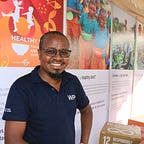Smallholder farmers in Kenya’s arid Turkana County explore new markets for their produce
With donor support, WFP builds resilience against droughts by supporting irrigation farming and then buys the harvest for school meals
Jackson Akure, 44, is one of the farmers in a group that is part of an irrigation scheme in Loima sub-county in Turkana in northern Kenya. He is keen to increase yields from his two pieces of land of some 1.8 hectares (4.5 acres).
Jackson benefits from resilience activities from the United Nations World Food Programme (WFP), where food insecure families help build productive assets in exchange for food or cash to cushion them from immediate hunger.
WFP through a Local and Regional Purchase initiative has contracted five farmer groups in Turkana including Jackson’s to supply sorghum and cowpeas to schools for the government-run home-grown school meals programme.
WFP formally handed over the responsibility of providing school lunches in Kenya to the Government in October. But it is working with the ministries of education, agriculture and health as well as the county government to introduce new items — in Turkana sorghum and cowpeas — on school menus.
This collaboration is part of the capacity strengthening and technical support that WFP continues to provide to the government after the formal handover.
Jackson lost his sight when young and is unable to work on the farm himself. But that does not stop him having a clear vision of what he wants. His 14 children are now in school, the eldest graduating from secondary school this year. His two wives cannot do all the farm work. So Jackson pays labourers.
“I would like the County Government to help mechanize the farms,” said Jackson. “Tilling the land or digging canals will be quicker and easier.”
Helping farmers sell their harvest for school meals
“It is costly paying young men to till the land,” said Jackson. “But at the end of the day, I get returns from the sale of the harvest.”
This harvest season, Jackson found that he had yet another reason to smile. He sold all his harvest — one metric ton or 20 50-kilogramme bags — to WFP.
“We are supplying 200 bags of sorghum and 200 bags of cowpeas to WFP,” said Sylvester Ekai, the group’s secretary. “This is the first time the group is supplying in bulk — we have always been selling our produce individually in the local markets.”
With support from the U.S. Department of Agriculture (USDA), WFP is implementing local and regional procurement in support of providing school meals in Baringo, Turkana, and West Pokot counties.
One of the objectives is to diversify schoolchildren’s diets using local produce in arid areas. In Turkana, cowpeas and sorghum have been identified as both commonly available and nutritious substitutes for more rain dependent maize and beans.
While WFP’s forward contract only guarantees a market for a portion of Jackson’s group’s produce, it is reassuring for farmers as well as a learning process. They say they are now eager to explore other structured markets.
“Selling as a group is better for us because we can jointly search for markets and negotiate better prices,” said Jackson. “WFP gave us a contract at the beginning of the season — we knew we had a market for our crops.”
Safe and nutritious foods for school children
The farmers’ group received equipment, including moisture meters, weighing scales, a gunny bag sewing machine and a mill, and various kinds of training — including how to handle the harvest to minimize losses or contamination.
“As a parent, I’m happy that our food, which we have grown here, is going to feed our own children,” said Sylvester. “We are assured that the food is safe, because we harvest and store it only for a short period of time before it is taken to the schools.”
For resilience building, WFP has supported farmer groups in Turkana to build proper storage structures and provided training on taking care of the harvest to maintain safety and quality of the food. The groups have grown to the extent of being able to produce, aggregate and sell to structured markets.
County-based public health officers carry out inspections, grading and testing of food for schools and markets. This is after they receive training on food inspection and good hygiene practices. The training was extended to school administrators and cooks with support from the McGovern-Dole Food for Education Program under the U.S. Department of Agriculture (USDA).
Diversifying home-grown school meals
“We train farmers to produce crops that are culturally acceptable and that suit the climate in northern Kenya,” said Gabriel Ekaale, the WFP Agribusiness Officer in Turkana County. “We are also training school cooks on recipes and methods of preparing these foods so that they remain nutritious and tasty.”
WFP aims to supply almost 140 schools with a third of one term’s supply of sorghum and cowpeas in Turkana South and East sub-counties in the new school term starting in January 2019. The government-led national school meals programme can follow a similar local purchase model.
Ministries and counties work to ensure that farmers keep producing quality produce that can be included on school menus. The schools are a ready market for local produce that directly benefits local farmers and their families.
Jackson Akure, who never got a formal education, says he hopes that his farm will manage to yield enough in profits to help him to educate his children through to university. “This would make me a very proud father,” he said.
WFP’s asset creation activities in Kenya are made possible through the support of: Australia, Canada, the European Commission, Finland, Germany, Italy, Japan, Kenya, Luxembourg, Multilateral Donors, Norway, Private Donors, Russian Federation, Sweden, Switzerland, UN CERF and the United States of America.
